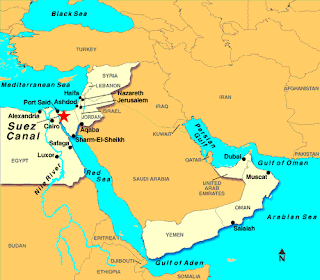As an alternative to the violence-plagued Suez Canal, Israel is on the verge of finalizing a rail route...
Israel was created as a Western Geopolitical wedge from inception, in the middle of MENA, cutting the Levant from the Suez, cutting the Eastern flank of the Arab World from North Africa...and a strategic choke hold on the crucial maritime routes in the area...
Israel is close to finalising the route of a rail alternative to the Suez Canal as instability in Egypt has added to the urgency of a project to connect the Mediterranean with the Red Sea.
Last month 40 people were killed in protests in the three big Egyptian cities lining the canal, and some shipping groups had to suspend work for several days. President Morsi has warned of a “collapse of the State” if protests continue. Fees for using the canal are Egypt’s only reliable source of foreign currency, bringing in about $5 billion (£3.22 billion) of revenue a year.
Israeli officials have publicly denied suggestions that the plan threatens Egypt’s monopoly of one of the world’s most important trade routes. But privately they admitted that they were being asked to plan for the “day after” a closure of the canal.
“There are a number of scenarios that we need to prepare for, including the peace treaty between Israel and Egypt being challenged, or groups attempting to seize control of Suez in one of the ongoing protests there,” one senior Israeli official involved in the project said. “Israel, and the rest of the world, can’t sit around and wait for the day to come where we can’t transport goods between Asia and Europe. We have to create other channels.”
The project, funded by the Chinese Government, would include the construction of a port on the Red Sea coast near the Israeli city of Eilat, and a double-track railway line capable of carrying heavy cargo to the Israeli port of Ashdod on the Mediterranean coast.
Binyamin Netanyahu, Israel’s Prime Minister, has declared it a “national priority” as it would transform Israel into a major player in global shipping. Building on the project, expected to take a decade, could begin this year.
Shipping companies said that Egypt’s military has maintained a strong presence around the canal to ensure that trade is not affected by the protests.
However, Gil Miller, managing director in Israel for the shipping group Maersk Line, said that while neither Maersk nor its big competitors wanted to find an alternative to Suez, recent events had forced them to consider “contingency plans”.
“The few days of disruptions ... were concerning, but manageable. We have, however, prepared other options for our company that can be activated in a short time and we are looking at the route being built in Israel,” Mr Miller said.
Israeli media have estimated that construction of the rail line alone would cost $2 billion, and the enlargement of the ports near Eilat and Ashdod could cost billions more.
An Israeli diplomat said that there was a great deal of interest in the project in China and India, as well as other countries in the region that he could not name due to “sensitivity”.
This week Israel’s Government heard final plans for the route through Israel, which environmentalists claim would cause irreparable damage and be a source of pollution. Israeli officials said that they would hear objections to the route before approving the plans.
Eran Feitelson, a transport expert at the Hebrew University of Jerusalem, wrote in Haaretz newspaper: “For Egypt, the Suez Canal is an essential artery for economic survival; we are trying to create a threat to this artery.”




No comments:
Post a Comment